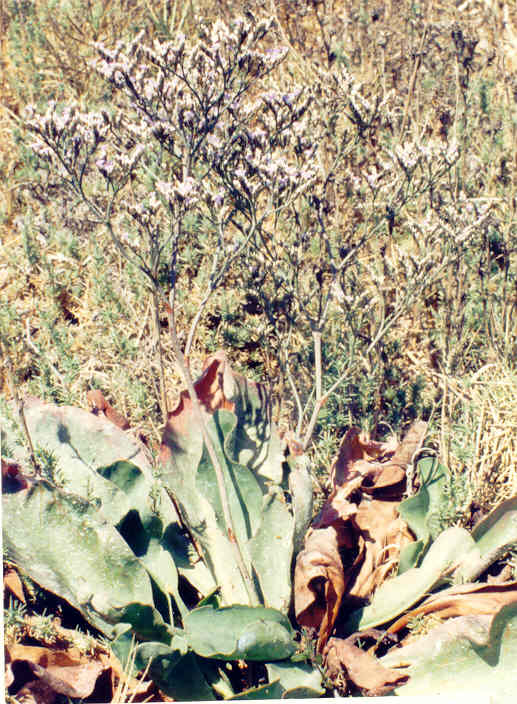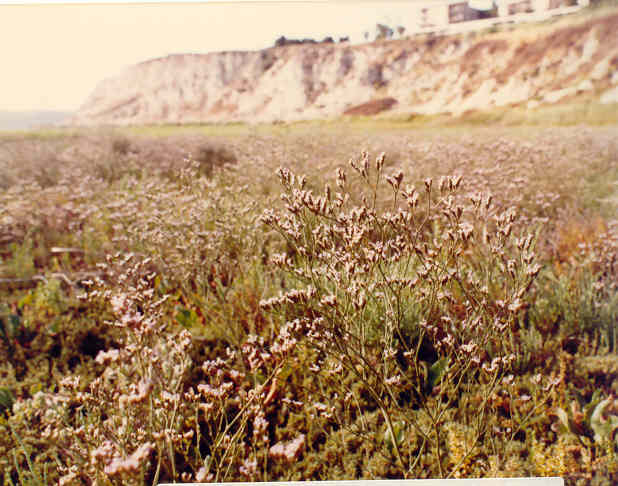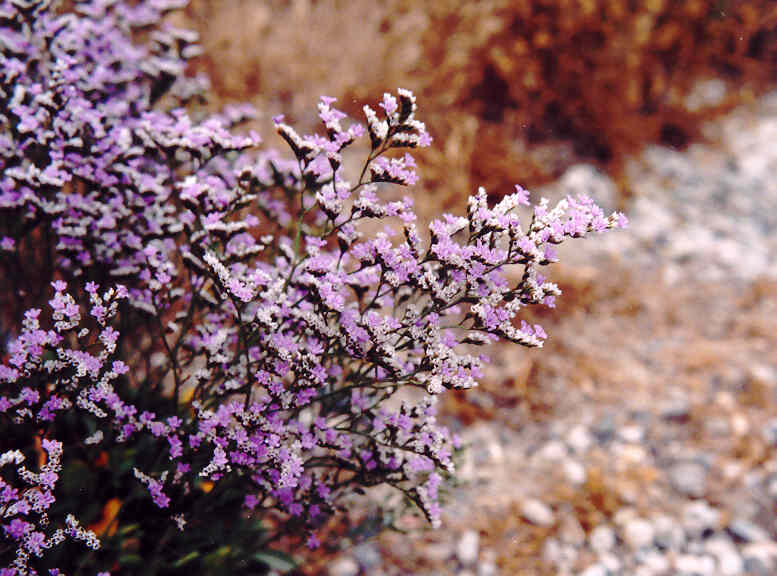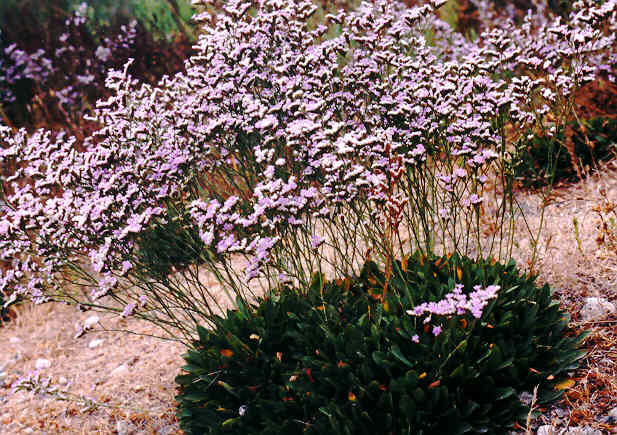
Limonium californicum (Boiss.) A.A. Heller
=Statice californicum
Plumbaginaceae (Leadwort Family)
Native
Sea Lavender
California Marsh-Rosemary
 |
Limonium californicum (Boiss.) A.A. Heller=Statice californicumPlumbaginaceae (Leadwort Family)NativeSea LavenderCalifornia Marsh-Rosemary
|
September Photo
Plant Characteristics:
Perennial, with caudex heavy, woody, reddish; lvs. oblong to oblong-ovate,
mostly obtuse, the blades 5-20 cm. long, tapering into petioles ca. as along;
scape stout, 2-5 dm. high, loosely paniculate, with branches densely fld. at
tips with small secund stipes 1-3 cm. long; fls. ca. 5-6 mm. long, and 2 mm.
wide; calyx obconic, the ribs pubescent to above the middle, lobes whitish,
deltoid-ovate, ca. 0.6 mm. long, acutish; petals pale violet, oblong, slightly
exceeding calyx.
All of the authors except Mason describe the leaves as above.
Mason describes a much smaller leaf 4-8 cm long, with obtuse, obovate to
oblong-spatulate blades, tapering to a petiole about as long as the blade.
My observation is that the blades of the smaller-leaved plants are more
pointed and mucronate, not obtuse as described by Mason.
The smaller-leaved plants grow in dense clusters while the larger variety
are much more open, although still in clusters.
Both types grow adjacent to each other at North Star Beach and along Back
Bay Drive across from the electric substation.
Both types apparently are included in Limonium californicum.
There are also differences in the flowers; the sepal tips of the
small-leaved plants are broad and rounded, while in the large-leaved plants they
are toothed. In the small-leaved
plants the rib of the sepal is pink at the upper end and colorless otherwise; in
the large-leaved plants the rib of the sepal is green edged, otherwise
colorless.
Habitat:
Coastal Salt Marsh, Coastal Strand; San Diego Co. to n. Calif.
Below 50 m. July-Dec.
Name: Greek, Leimonion, supposedly from leimon,
a marsh. (Munz, Flora So. Calif. 637). Californicum
indicates that the species was first found in California.
(Dale 13).
General:
Very common in the study area. Photographed
on North Star Beach, at Big Canyon and along Back Bay Dr. from San Joaquin Hills
Dr. to Big Canyon. (my comments).
One of the native halophytes listed as occurring in Upper Newport Bay.
(Zedler 16). See Spartina
foliosa for the complete list. See my
notes with the plant description above (my
comment). Sea
lavender, Limonium californicum, is
the showiest of the southern California halophytes.
Inflorescences up to a meter tall rise from a basal rosette of broad,
spatulate leaves. Hundreds of tiny
lavender flowers appear and dry on the stalks, much like its ornamental relative
Statice.
Of the species that actively secrete salt, sea lavender is perhaps the
most conspicuous. There is usually
a crust of salt crystals on the underside of the leaves, and at times whole
leaves are white from the dried brine. Sea
Lavender reproduces both vegetatively and by seed, and given sufficient time,
can become abundant along artificial dikes or bare ridges.
(Zedler 30).
Salt excreting species
include Spartina foliosa, Monanthochloe littoralis,
Distichlis spicata, Frankenia
salina and Limonium californicum.
(Zedler 51). Found in upper Big Canyon in 1992
where it was probably introduced, along with L. sinuatum,
to reseed the area after it was graded to create the fresh water pond. The upper
Big Canyon variety is the small-leaved one described above.
It is surprising to find it in a fresh water environment. (my
comments). Delfina Cuero, a Kumeyaay or Southern Diegueno Indian, made the following
comments about Limonium californicum
in her autobiography: "We
boiled the young leaves to eat as vegetables.
The leaves also can be dried and stored, they keep well for future
use." (Shipek 92). Almost 200 spp., of wide
distribution, often along the seaside. (Munz,
Flora So. Calif. 673).
Text Ref:
Hickman, Ed. 822; Munz, Calif.
Flora 410; Munz, Flora So. Calif. 637; Roberts 32.
Photo Ref:
Dec 2 82 # 16,22; July 2 83 #13; June-July 93 #15; Sept 97 # 5A;
June-July 03 # 10A.
Identity: by R. De Ruff.
First Found: December 1982.
Computer Ref: Plant Data 247.
No plant specimen.
Last edit 5/4/05.
 |
 |
 |
July Photos